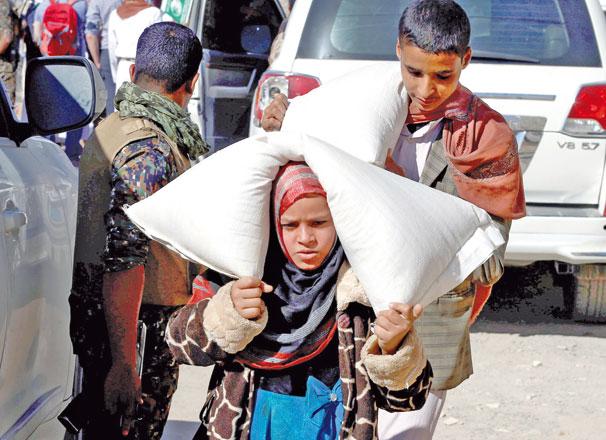You are here
Yemen government bans protests in Aden ahead of separatist deadline
By Reuters - Jan 27,2018 - Last updated at Jan 27,2018

People carry sacks of wheat they received from a Saudi aid distribution centre at an internally displaced people's camp near Marib, Yemen, on Friday (Reuters photo)
ADEN — Yemen's internationally-recognized government said on Saturday it had banned public gatherings in Aden ahead of a deadline given by southern separatists to President Abed Rabbo Mansour Hadi to dismiss the cabinet.
The Southern Transitional Council, comprising senior political figures allied to the United Arab Emirates (UAE), announced last Sunday it planned to oust the government of Ahmed Bin Daghr over allegations of corruption and mismanagement if Hadi did not dismiss it within a week.
The new crisis could jeopardise a rare opportunity offered by the death of former president Ali Abdullah Saleh last month that had given a Saudi-led coalition the chance to isolate Iran-aligned Houthi fighters and end a devastating war that began in 2015.
In a statement carried by the state-run Saba news agency, the Yemeni interior ministry said it had "decided to ban any gatherings, sit-ins or marches in the interim capital, Aden”.
"These actions will be considered acts that target stability and calm," the statement said, adding that all armed groups will also be banned from entering Aden.
Gathering expected
on sunday
Residents said they had not seen any extra security in Aden, where armed forces loyal to Hadi's government, the Southern Transitional Council and the Saudi-led coalition are all present.
But witnesses said government forces were deployed on roads leading to the presidential palace in the Maasheeq area, where the government is based.
Witnesses also said that thousands of people had arrived in Aden from across the former South Yemen, which merged with North Yemen in 1990, to participate in a gathering expected to be held on Sunday.
Yemen has been torn by armed conflict since the Houthis captured the capital Sanaa in 2014 before they marched south towards Aden the following year in a military campaign that culminated with Hadi fleeing into exile.
The Saudi-led coalition that entered the war after Hadi sought refuge in Saudi Arabia in March 2015 has helped local fighters free Aden from Houthi control and made other military gains in different parts of the country. But the Houthis continue to control most of northern Yemen, including Sanaa.
The Southern Transitional Council was formed last year to push for a split between the former South Yemen and North Yemen.
Southern forces have previously clashed with Hadi supporters, including members of the Islamist Islah Party, over control of strategic areas, such as Aden airport and oil facilities.
Related Articles
ADEN — Yemen’s government accused southern separatists of an attempted coup on Sunday after they took over its headquarters amid fierce clas
ADEN, Yemen — Four people were killed on Monday in a second day of fighting between rival factions seeking control of the southern Yemeni po
ADEN — Yemen's prime minister on Monday flew back to the southern city of Aden under the terms of a peace deal with southern separatists, wh















